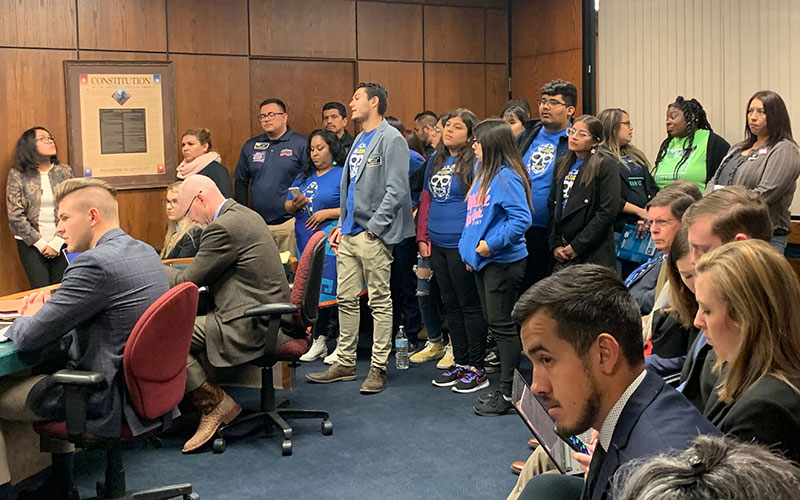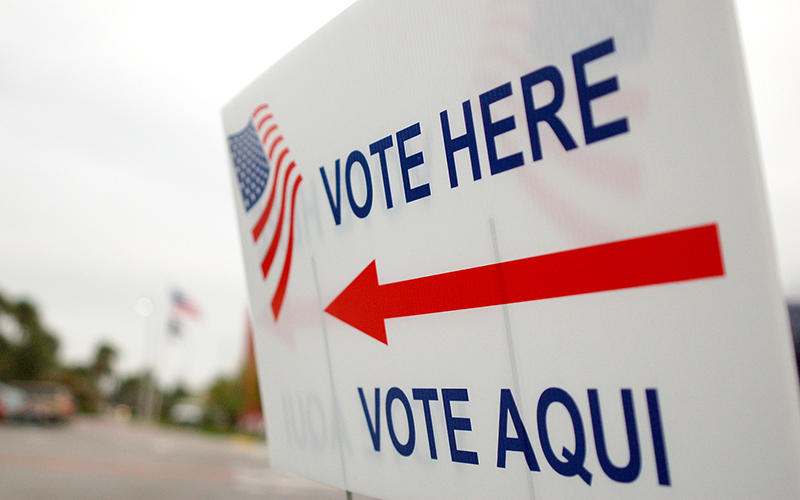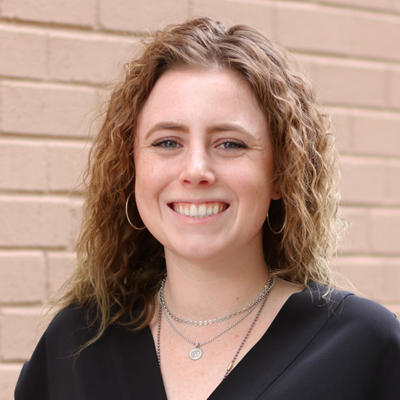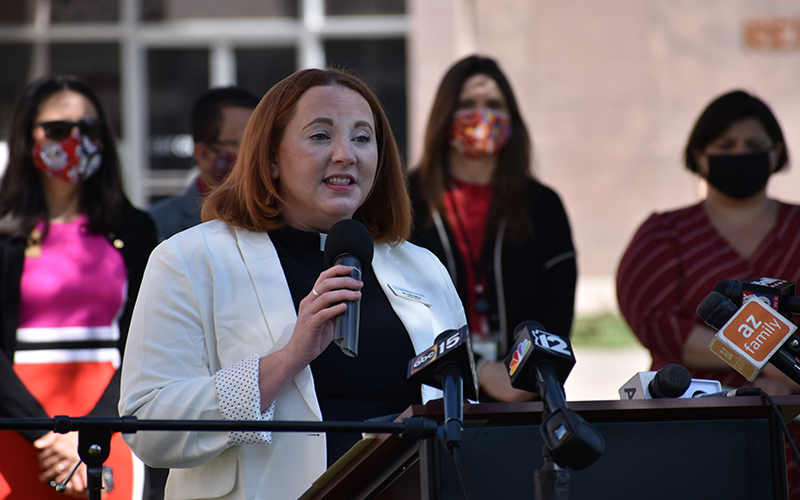
The Rev. Katie Sexton of the Arizona Faith Network speaks Wednesday at the state Capitol in favor of federal legislation to expand and protect voter rights. (Photo by Kelly Richmond/Cronkite News)
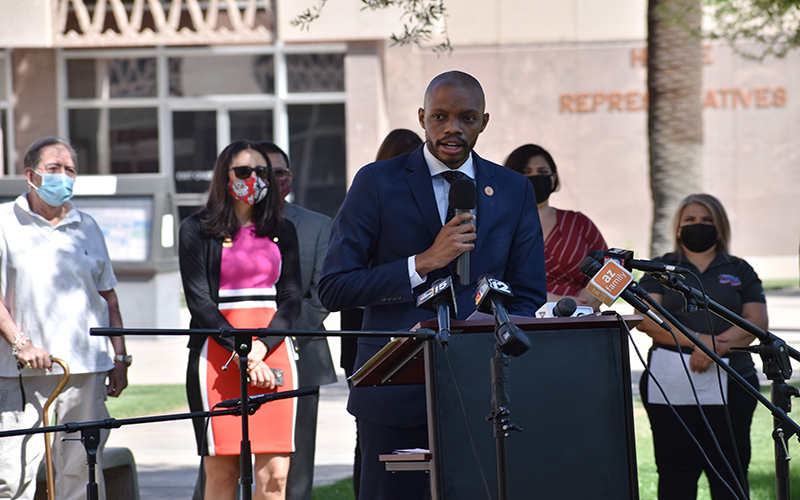
State Rep. Reginald Bolding, D-Phoenix, believes that “the Republicans in the Legislature are coming for your voting rights.” (Photo by Kelly Richmond/Cronkite News)
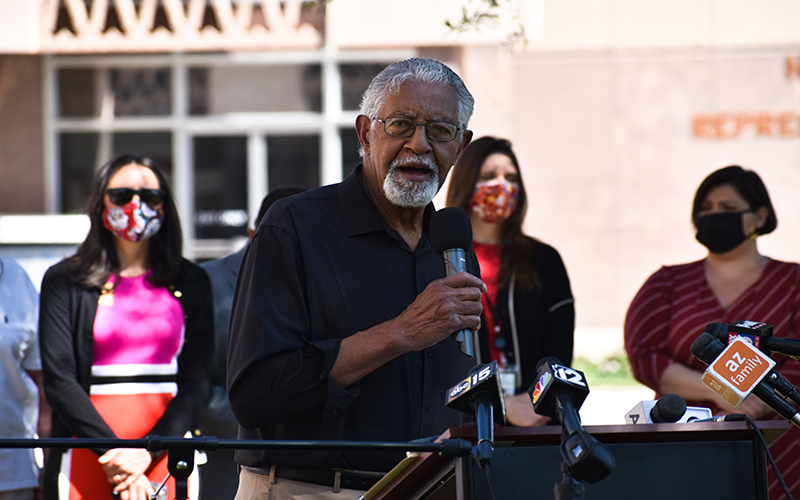
“Today we are back at the battleground,” Mel Hannah of the state NAACP tells the crowd of about two dozen. (Photo by Kelly Richmond/Cronkite News)
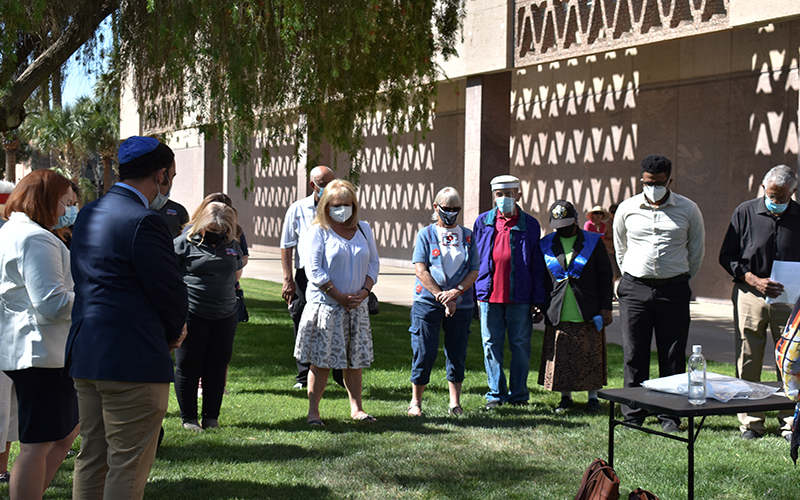
Activist and faith leaders who spoke in favor of federal voters’ right bills start their gathering at the Capitol with a prayer circle. (Photo by Kelly Richmond/Cronkite News)
PHOENIX – Faith and community leaders on Wednesday demanded Arizona’s elected officials stand against “voter suppression” laws, joining a national movement that has embroiled businesses and lawmakers across the U.S.
Supporters criticized bills in the Arizona Senate and House pushing for further identification requirements, purges of the permanent early voting list and the possibility of criminal action against voters.
The bills were introduced weeks after Arizona voted blue in the presidential election for the first time since 1996, which prompted a flurry of election challenges from former President Donald Trump and his allies. At the time, Gov. Doug Ducey, Secretary of State Katie Hobbs and Attorney General Mark Brnovich all defended Arizona’s election.
The Arizona critics echoed a sentiment that voting rights advocates have repeated throughout the country, saying the rush to restrict voting recalls the days of “Jim Crow,” when Black voters routinely were segregated and disenfranchised by state laws and oppressed under the stamp of government policy and often-violent regimes.
“Today we are back at the battleground,” said Mel Hannah, a leader in the Arizona NAACP, standing before about two dozen community organizers and faith leaders at the state Capitol.
Voting access persists as a central issue on the national and state level. Advocates say voter suppression laws disproportionately impact people of color, the elderly and people with disabilities.
Similar laws, deemed attempts at voter suppression by rights advocates, cause alarm across the country and a battle over the ballot box between Democrats and Republicans. Georgia lawmakers enacted a controversial bill on March 25 that opponents say limits ballot access, confuses voters and is meant to return advantages to Republican lawmakers, especially in Congress.
Supporters say the law will enhance election integrity, after what Georgia Gov. Brian Kemp called “a crisis of confidence in the ballot box.” Trump falsely claimed the Nov. 3 election was stolen, a claim rejected by Kemp, Georgia’s secretary of state and the courts but parroted by national Republican leaders.
Georgia, which sent its first Black senator to Congress in November, has become the epicenter of a new battle over voting rights as proposed laws crop up at state houses. Delta and Coca-Cola, after pressure from Black chief executives and other leaders, denounced the bills. In response, Republican legislators have threatened to take away millions of dollars in corporate tax breaks.
Greater Phoenix Leadership, a business group, last week opposed similar legislation in Arizona in a statement, citing similar claims of voter suppression. Arizona was among the battleground states whose election results were unsuccessfully challenged by the Trump campaign, and Ducey, the attorney general and state election officials have defended the election as fair and free of widespread fraud.
Rep. Michelle Ugenti-Rita R-Scottsdale, sponsor of a bill requiring additional voter identification for mail-in ballots, said on Twitter that the business group’s statement is “misrepresenting what the bill does and ‘feeding mass hysteria.’”
She described Senate Bill 1713 as “mild in nature and modest in scope.”
Critics say otherwise.
“We want everyone to have a voice,” said Rep. Reginald Bolding, D-Phoenix. “And we believe that voice starts with their vote.”
At the event at the Capitol, speakers implored Ducey to veto any voter suppression legislation that makes its way to his desk. They also called on U.S. Sens. Mark Kelly and Kyrsten Sinema, both Democrats, to continue to support federal legislation that strengthens voting access and rights.
Wednesday’s event was part of a nationwide movement to oppose some voting legislation and support federal legislation, known as the For the People Act, which would expand voting rights and access. It also marks Democracy Week, organized by the Declaration for American Democracy, a coalition of more than 200 progressive-leaning advocacy groups.
The Capitol effort brought six groups, including Mi Familia Vota, the African American Christian Clergy Coalition, Arizona Faith Network and the Jewish Community Relations Council.
Sen. Martin Quezada, D-Glendale, also issued a statement in Spanish and English assailing proposed changes to voter access.
“Voting is an outward response to our shared lived experiences,” he wrote. “Creating a system that only favors the rich and the well-connected will naturally create a government lacking the knowledge of what our state desperately needs.”
The groups oppose three state Senate bills and a House bill sponsored by state Republicans:
House Bill 2569, which was debated Wednesday in the Senate, prohibits governments that handle elections at the state, county or school district level from supplementing their budgets with private funds to help register voters.
Joel Edman, executive director of the Arizona Advocacy Network, said election departments need help on that front.
Heritage Action for America, a conservative grassroots organization, issued a statement on HB 2569, calling it another measure “taken to protect election integrity and keep the influence of private money out of Arizona’s election system.”
Three Senate bills also faced scrutiny from voting rights advocates. In addition to SB 1713, which would require additional identification to vote by mail, SB 1485 would purge registered voters from the early voting list if the voter fails to use an early ballot in the primary and general elections for two consecutive elections, and SB 1106 which proposes felony charges for those who register to vote without the intent to remain in the state.

